
About UsThe Numismatic Bibliomania Society is a non-profit organization promoting numismatic literature. For more information please see our web site at coinbooks.org SubscriptionsThose wishing to become new E-Sylum subscribers (or wishing to Unsubscribe) can go to the following web page link MembershipThere is a membership application available on the web site Membership Application To join, print the application and return it with your check to the address printed on the application. Membership is only $15 to addresses in the U.S., $20 for First Class mail, and $25 elsewhere. For those without web access, write to: David M. Sundman, Secretary/TreasurerNumismatic Bibliomania
Society AsylumFor Asylum mailing address changes and other membership questions, contact David at this email address: dsundman@LittletonCoin.com SubmissionsTo submit items for publication in The E-Sylum, just Reply to this message, or write to the Editor at this address: whomren@coinlibrary.com
BUY THE BOOK BEFORE THE COINYou won't regret it! |
- WAYNE'S WORDS: THE E-SYLUM JULY 12, 2009
- KOLBE TO AUCTION THE STACK FAMILY NUMISMATIC LIBRARY
- KOLBE NUMISMATIC BOOKSELLER FIXED PRICE LIST #49 AVAILABLE
- NEW E-BOOKS IN KRAUSE PUBLICATIONS' COINS OF THE WORLD SERIES
- BOOK REVIEW: WHITMAN ENCYCLOPEDIA OF COLONIAL AND EARLY AMERICAN COINS
- MAIL BID SALE OF PHILIPPINE NUMISMATIC LITERATURE
- WHITMAN PUBLISHING AUTHORS AT THE 2009 ANA CONVENTION
- MORE ON THE 100 GREATEST ITEMS OF AMERICAN NUMISMATIC LITERATURE
- TAMS JOURNAL JUNE 2009 ISSUE PUBLISHED
- QUERY: MEDAL SIZE CONVERSION CHART SOUGHT
- DICK JOHNSON ON THE CONTAMIN REDUCING MACHINE
- MORE ON ANS LIBRARIAN JAMES D. FOSKETT
- QUICK QUIZ: WHO STARRED THE S-48 IN A FILM?
- MORE ON EARTHQUAKE TOKENS AND MEDALS
- ON THE AUSTRIAN SILVER PHILHARMONIC COIN
- ON LOW-VALUE DEBIT CARDS
- BANKRUPT CALIFORNIA ISSUES PAYMENT WARRANTS
- G8 SUMMIT LEADERS GIVEN IMAGINARY FUTURE WORLD CURRENCY
- UNITED FUTURE WORLD CURRENCY COINS
- ROYAL AUSTRALIAN MINT MOUNTS NEW COIN EXHIBIT
- 1889 RHODE ISLAND LIFESAVING MEDAL TO BE DISPLAYED
- THE CRAZE FOR THE ROYAL MINT'S DATELESS 2009 TWENTY PENCE
- VIRTUAL CURRENCY IN CHINA: THE QQ COIN
- THE STANDARD GRILL'S FLOOR OF PENNIES
- FEATURED WEB SITE: EARLY MEDIEVAL CORPUS OF COIN FINDS
WAYNE'S WORDS: THE E-SYLUM JULY 12, 2009
 Among our recent subscribers are Steve Frank and Michael Hudson. Welcome aboard! We now have 1,236 subscribers.
Among our recent subscribers are Steve Frank and Michael Hudson. Welcome aboard! We now have 1,236 subscribers. Roger Siboni writes:
Thanks! It's always fun to put together and I enjoy hearing from readers.
Phil Iverson writes:
I noticed that in my copy, too, as did Pete Smith. Sorry! I'm not sure how this happens, but it did occur once before. The issue looks good on our web site, though, so readers can always check there if there is a problem with formatting. See: www.coinbooks.org/esylum_v12n27toc.html .
Ken Berger writes:
No - nothing's changed in recent weeks. Just mark the sender as "not Junk" and it should come thru fine hereafter.
This week we open with another surprise from the Stack's firm of New York, but it's good news for numismatic bibliophiles (and George Kolbe, who has a new fixed price list out this week). Next is word from Krause Publications on new e-books from their Coins of the World digital price guide series, and a review of the Whitman Colonial coin encyclopedia by John and Nancy Wilson.
But that's not all for numismatic literature - Charlie Davis chimes in on the 100 Greatest list and I discuss the latest issue of the TAMS Journal.
Other topics include the Contamin reducing machine, more earthquake tokens and medals, the California treasury warrants, a rare Rhode Island lifesaving medal and the "Eurodollar" coin, a proposed unified world currency.
To learn about the bar whose floor is literally paved with money, read on. Have a great week, everyone!
Wayne Homren
Numismatic Bibliomania Society
KOLBE TO AUCTION THE STACK FAMILY NUMISMATIC LIBRARY

For over fifty years, the fabled American portion of the library has resided in antique bookcases lining one wall of Harvey Stack’s office, and along the opposite wall as well. Other portions of the library were, for many years, located throughout the main floor of the firm’s New York City retail location at 123 West 57th Street and many of the great classic works on ancient and foreign coins and medals were carefully arranged on the second floor in the Coin Galleries offices.
Covering virtually all aspects of numismatics and replete with rarities, it is the finest comprehensive working library on numismatics ever formed in the United States.
Key works from this magnificent library will be sold at the Waldorf Astoria Hotel in New York City in conjunction with the New York International Numismatic Convention this coming January. The profusely illustrated catalogue will be arranged in two parts: rare and classic works on American coins, medals, and tokens, and key works on ancient, medieval, and modern numismatics.
Copies of the catalogue may be reserved by sending $35.00 to George Frederick Kolbe, P. O. Drawer 3100, Crestline, CA 92325. Telephone: (909) 338-6527; Fax: (909) 338-6980; Email: GFK@numislit.com. The catalogue will also be accessible free of charge several weeks before the sale at the firm's web site: www.numislit.com.
Some of the American highlights include: the firm’s own complete bound set of their auction sale catalogues, comprising an unparalleled source of data on rare American coins, medals, tokens, and paper money; a photographic record of the fabled collection of $2.50, $5.00, and $10.00 United States gold coins from the collection of Colonel E. H. R. Green, housed in three handsome leather-bound volumes; inventories of the incomparable Louis Eliasberg collection; nearly all of the Chapman brothers auction sale catalogues issued with original photographic plates; classic works on large cents from the library of legendary collector Henry Hines, often filled with letters and research notes assembled by the “Big Three of the Big Cents”: Hines, Howard Newcomb, and George Clapp.
Also featured are long runs of classic nineteenth and early twentieth century coin auction sales, including many great rarities; the 1915 United States Coin Co. sale of the Granberg collection, with 7 photographic plates; complete sets of The Numismatist (including the first six volumes), the American Journal of Numismatics, Frossard’s Numisma, and both series of The Coin Collector’s Journal; deluxe leather-bound editions of various classic Stack’s sales; Walter Garrabrant’s photographic record of Hard Times tokens; unique Lyman Low bid books; J. N. T. Levick’s own annotated copy of his April 27-29, 1865 coin collection (postponed to May 28, 1865 due to the assassination of President Lincoln), one of only twelve specially issued; a large paper copy of Hickcox’s 1858 “Historical Account of American Coinage”; etc.
Among classic works on ancient and foreign numismatic topics to be featured in the January 2010 are: a complete original set of Georgii Mikhailovic’s monumental work on Russian coins, including part 2 of Peter the Great, bound in thirteen volumes; a comprehensive library on ancient numismatics including sets of the classic Danish and other Sylloge Nummorum Graecorum series, Greek Coins in the British Museum, Harberlin on Aes Grave, Gnecchi on Roman medallions, Mazzini, Hunter, RIC, Ars Classica sales, etc. Classic sets on medieval and modern German numismatics include Hoffmeister on Hesse, Dannenberg on Saxony, Bahrfeldt on Marienburg, and Fiala on Brunswick, among others. Included as well is a set of Corpus Nummorum Italicorum and classic works on Renaissance medals.
As the library is catalogued over the coming months, further details will be provided. At present, a second sale is planned later in 2010.
KOLBE NUMISMATIC BOOKSELLER FIXED PRICE LIST #49 AVAILABLE
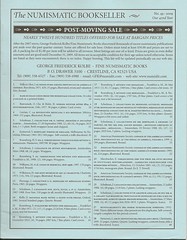 From the price list:
From the price list: To visit the Kolbe web site, see: www.numislit.com
NEW E-BOOKS IN KRAUSE PUBLICATIONS' COINS OF THE WORLD SERIES
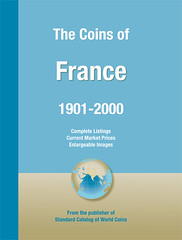 Following the successful launch of Krause Publications’ Coins of the World line, an electronic series of smaller, geographically focused coin listings and market prices based on content from the trusted Standard Catalog of World Coins, comes an expanded variety of products. This latest round of downloadable PDFs is available exclusively at KP’s online store, ShopNumisMaster.com.
Following the successful launch of Krause Publications’ Coins of the World line, an electronic series of smaller, geographically focused coin listings and market prices based on content from the trusted Standard Catalog of World Coins, comes an expanded variety of products. This latest round of downloadable PDFs is available exclusively at KP’s online store, ShopNumisMaster.com. “The enthusiastic response we received following the Coins of the World debut showed us that collectors want the authoritative content from the Standard Catalogs in a tailored, easy-to-use format,” said Maggie Stigsell, editor of World Coin News. “This spurred us to offer an expanded product line to meet the needs of even more collectors.”
The latest listings by country are France, Poland, Australia, Portugal, Netherlands, Austria, Spain, Greece, Israel and Italy/San Marino/Vatican. The newest geographic bundle packages cover Scandinavian countries, South Pacific Islands, Caribbean Islands, Central Asia, East Asia and coins of the Pobjoy Mint.
All Coins of the World downloads are affordably priced, starting at $7.99 up to $14.99, depending on the volume of information included.
When a customer purchases a Coins of the World download from ShopNumisMaster.com, they receive a PDF file that allows them to enlarge on-screen images or print pages for portable access. As an added advantage over the printed catalog, the electronic products are fully indexed and searchable.
More additions to the series -- covering more countries, regions and dates -- are planned for the near future.
The Coins of the World series, as well as other coin and paper money resources, can be viewed and purchased at www.ShopNumisMaster.com
Scott Tappa adds:
LAKE BOOKS
- Lot A20 - Ebeneezer Mason - "Smith Cabinet I".
- Lot A29 - B. Max Mehl - "James Ten Eyck" with 6 plates.
- Lot C39 - A. M. Smith - "Visitor's Guide....US Mint (Philadelphia).
- Lot E24 - Aloiss Heiss - "Monedas Hispano-Cristianas" reprints.
- Lot E36 - Richard Long - "Gold Coins of the Early Mexican Republic".
- Lot E49 - R. Walsh - 1828 - "Ancient Coins, Medals, and Gems".
- Lot F70 - Wong Hon Sum - "Currency of Japanese Occupation of Malaysia".
- Lot G19 - R. S. Yeoman - "Redbook" - the NLG Bash Edition.
- Lot J17 - Stack's - a complete set of "Numismatic Review" housed in a hand-crafted box with gilt title. Edited by T.O.Mabbott, these are rich in information.
BOOK REVIEW: WHITMAN ENCYCLOPEDIA OF COLONIAL AND EARLY AMERICAN COINS
 Q. David Bowers has done it again with this encyclopedia of Colonial and Early American Coins. This hard cover 352 page book with over 2,000 color pictures has 12 Chapters. It covers the entire field of money in early America. The book is a general guide to the entire field of US colonial coins. It also covers the history of money in America and how it was made and distributed.
Q. David Bowers has done it again with this encyclopedia of Colonial and Early American Coins. This hard cover 352 page book with over 2,000 color pictures has 12 Chapters. It covers the entire field of money in early America. The book is a general guide to the entire field of US colonial coins. It also covers the history of money in America and how it was made and distributed. Each section lists all known varieties with color pictures of each along with commentary and diagnostics on that variety and its rarity and estimated current value in each of several conditions. The photographs are well done and clearly show the necessary characteristics of that variety where such a coin exists. Later European coins and tokens along with foreign coins traditionally associated with colonials as well as 19th-century copies and fantasies are described and pictured. The stories surrounding the making of the copies and fantasies are also given.
Dave has written a book that is clear and easy to read and understand and keeps the reader wanting to learn more. Many specialists in each series were consulted to obtain the latest information in each series. We highly recommend this great reference to Bibliophiles and economic historians.
The Whitman Encyclopedia of Colonial and Early American Coins by Q. David Bowers has already sold out by the publisher, Whitman Publishing, LLC. Whitman can be contacted at: 3103 Clairmont Road, Suite B., Atlanta, GA 30329, (800) 546-2995, www.whitmanbooks.com.
The hardcover edition retails for $49.95 and the Limited Edition which is limited to 250 copies is $99.95. The Limited Edition is still available from the publisher. The other sold out edition should be available from numismatic literature dealers nation wide
MAIL BID SALE OF PHILIPPINE NUMISMATIC LITERATURE
 Ray Czahor of Cookie Jar Collectibles in Columbia, MD specializes in coins and paper money of the Philippines. His Mail Bid Sale XIII closes August 25, 2009. It includes over 190 books, 70 lots of Stamps and the remaining lots are Philippine coins, tokens, medals, currency including 450 lots of WWII guerilla/emergency currency.
Ray Czahor of Cookie Jar Collectibles in Columbia, MD specializes in coins and paper money of the Philippines. His Mail Bid Sale XIII closes August 25, 2009. It includes over 190 books, 70 lots of Stamps and the remaining lots are Philippine coins, tokens, medals, currency including 450 lots of WWII guerilla/emergency currency.At my request Ray forwarded an image of lot #2043, History and Mintage Philippine Counterstamped Coins 1828-1839 by Fortich. The 250 page book (published in 2001) includes photos of 15 rare counterstamps and illustrated original archival documents.
To visit Ray's Cookie Jar Collectibles web site, see: http://mysite.verizon.net/cookiejarpi
WHITMAN PUBLISHING AUTHORS AT THE 2009 ANA CONVENTION
From the arena of paper money, these authors will be on hand: Arthur Friedberg (A Guide Book of United States Paper Money), Q. David Bowers (Obsolete Paper Money; 100 Greatest American Currency Notes; and the upcoming Whitman Encyclopedia of U.S. Paper Money), and Kenneth Bressett (United States Currency, now in its fourth edition).
World-coin collectors can meet Ira Goldberg and Larry Goldberg (Money of the World: Coins That Made History), Arthur Friedberg (A Catalog of Modern World Coins, 1850–1964, 14th edition), Harlan J. Berk (100 Greatest Ancient Coins), Ken Bressett (Money of the Bible, and Milestone Coins: A Pageant of the World’s Most Significant and Popular Money), and Paul Rynearson (Collecting Ancient Greek Coins: A Guided Tour Featuring 25 Significant Types).
Collectors of U.S. federal series will meet Richard Doty (America’s Money, America’s Story), Clifford Mishler (Coins: Questions & Answers), David W. Lange (History of the United States Mint and Its Coinage, and A Guide Book of Modern United States Proof Coin Sets), Ken Bressett (longtime editor of the Guide Book of United States Coins), Bill Fivaz (coauthor of the Cherrypickers’ Guide), Rick Snow (A Guide Book of Flying Eagle and Indian Head Cents), and Q. David Bowers (author of Whitman titles on Morgan dollars, double eagles, type coins, Washington quarters, Buffalo nickels, gold dollars, and other series).
Those who specialize in gold coins will be able to talk to Jeff Garrett (Encyclopedia of U.S. Gold Coins, 1795–1933, and 100 Greatest U.S. Coins) and Bill Fivaz (United States Gold Counterfeit Detection Guide).
The authors will make appearances at the Whitman Publishing booth during the show, with times to be announced. Fans are encouraged to ask questions, have their pictures taken, and talk about the hobby with their favorite numismatic writers.
THE BOOK BAZARRE
MORE ON THE 100 GREATEST ITEMS OF AMERICAN NUMISMATIC LITERATURE
2) A response of 60 voters or less than 20% of the membership is statistically flawed.
3) Early American Cents and Penny Whimsy are the same book and should not be given two of the top 20 spots.
4) Ditto with the Garrett auction catalogues and the Bowers History.
5) I can't see the Judd book deserving No. 9 — or 19, or 29. I suppose after 10 editions, and an army of contributors, they have it right, but it should not be rated more highly than a book that got it right the first time.
6) Breen on Half Cents and Large Cents rated more highly than Cohen and Noyes? When was the last time you saw a large cent or half cent attributed solely to a Breen designation? How can a book that is never cited be “greater” than one that is constantly cited?
7) Coin World at best deserves only an honorable mention, not No. 7. Recording mostly the news of the day, unlike The Numismatist or the Numismatic Scrapbook, it never published within its pages a standard reference. I don't imagine there can be more than a hand full of complete sets in existence making access to its contents virtually impossible today.
It is the one place I differ with Len Augsburger who wrote “The list is eminently collectible ... There are no unique or impossible items here.” When was the last the time a set of Coin World was offered? If one surfaced today, I might would not accept it for consignment as it would probably weigh 1500lbs and cost close to $1,000 to package and ship. We really are talking about an ephemeral item here.
8) With works like those above, plus The AJN, CNL, The Asylum and Penny Wise representing an entire body of work, the 100+ auctions catalogues of George Kolbe, not just the Ford and Bass sales, should have been nominated and placed somewhere in the top 25. They contain more valuable numismatic information, available nowhere else, than a number of those in the top 50.
9) Many will say I am on thin ice with this one, but I would have placed Mehl's Star publications very high on the charts. While his lists served him to buy coins cheaply, they may have fished a number of significant coins out of bureau drawers and put them in numismatic circulation.
During the depression, these coins might otherwise have been spent or melted. And how many people started collecting coins after buying a Star Encyclopedia which was advertised in Sunday newspapers for 30 years. The hobby and the A.N.A. benefited as well from this oft considered superficial and self centered booklet. (Remember, we are rating the "greatest." Perhaps your definition differs from mine.)
10) Len Augsburger’s commentaries form a delectable bibliophilic treat, and it would be a shame to publish it only to the NBS membership, 80% of whom could not trouble themselves to vote. I would suggest that it be reorganized in strict alphabetical order eliminating the 1-100 rating and published as an offprint for sale to non NBS members.
I would disagree on the value of Coin World - I think a large number of specialized articles within its pages are gems with information not always available anywhere else. But Charlie's right about its rarity - outside of the Coin World library in Sidney, OH (and perhaps the ANA library in Colorado Springs), I don't know where to find a complete set.
I would also differ with Charlie's assessment of the response to the survey. As one of the sixty who completed the lengthy survey, I know it took a lot of time and thought to complete. It's not like filling in your address on a response card and dropping it in the mail - for a typical marketing mailing like that a response rate of even 3% is impressive. 20% of recipients taking a big chunk out of their day to complete a survey seems like a big turnout to me.
-Editor
TAMS JOURNAL JUNE 2009 ISSUE PUBLISHED
 The June 2009 issue of TAMS Journal, the official publication of the Token and Medal Society, has been published. The issue includes TAMS librarian Peter Irion's From the Bookshelf column, Public School Athletic League Sunday World Walking Club Medals 1915-1916 School Year by Paul Lajoie, and Part 7 of Abraham Lincoln on Coins, Medals and Tokens by D. Wayne (Dick) Johnson, among other features.
The June 2009 issue of TAMS Journal, the official publication of the Token and Medal Society, has been published. The issue includes TAMS librarian Peter Irion's From the Bookshelf column, Public School Athletic League Sunday World Walking Club Medals 1915-1916 School Year by Paul Lajoie, and Part 7 of Abraham Lincoln on Coins, Medals and Tokens by D. Wayne (Dick) Johnson, among other features.The cover article is a great piece by Simcha Kuritzky on The Mount Carmel Center of Waco, Texas. Made infamous by Vernon Howell (a.k.a. David Koresh), the compound so famously besieged by the F.B.I. had a long prior history which included the issuance of scrip and tokens.

Many thanks to Simcha for providing these images. He adds:

QUERY: MEDAL SIZE CONVERSION CHART SOUGHT
Robert Rightmire writes:I have a question: Some older references (i.e Betts & Baker) use a numbering system to state the size of a medal (such as size 22). Is there a standard chart for conversion, to millimeters, for each size number? My own conversion chart, created just from medals I have researched, is surely not totally accurate and has gaps. Again, thanks.
THE BOOK BAZARRE
DICK JOHNSON ON THE CONTAMIN REDUCING MACHINE
The machine was probably an old Contamin. Brenner even mentioned this name on the facing page to the illustration in the pamphlet. There is the possibility Brenner had acquired one of these old machines on one of his two trips to France (1898-1901; 1904-1906).

Contamins had long been replaced by the British "Hill Engraver," and others, at the Philadelphia and European mints. There is record of Brenner having trouble getting a satisfactory die from his machine and he often turned to the Weil Brothers, Henri and Felix, to cut a better die in their New York City workshop. The Weils had imported the first Janvier die-engraving pantograph to America [and Henri had been trained in the Janvier factory, perhaps by Janvier himself] and Brenner was an early customer of the Weils. Brenner also employed their talents for making galvanos and patterns in their electrolytic casting tanks for models he created here in America.
Victor Janvier had worked for nearly a decade (1890s) improving these machines. He came up with a twin-cone mechanism that altered the speed of the spindles, speeding up and slowing down as necessary the two axis's, one controlling the speed of the pattern and the die in synchronous rotation, the other controlling the speed of the cutting tool. He patented his mechanism in 1899, built the highest quality machines possible at the time, thus mints of the world beat a path to his Paris factory to acquire his machines.
 One illustration in The E-Sylum last week showed Brenner at a press. This had to have been posed. Thank goodness he took off his suit coat and rolled up his sleeves. No self-respecting pressman would ever operate a press in a suit and vest! It is unknown where this press was located. Probably in the shop of "Leidels," a metal stamping shop in New York City that both Brenner and the Weils used at the time.
One illustration in The E-Sylum last week showed Brenner at a press. This had to have been posed. Thank goodness he took off his suit coat and rolled up his sleeves. No self-respecting pressman would ever operate a press in a suit and vest! It is unknown where this press was located. Probably in the shop of "Leidels," a metal stamping shop in New York City that both Brenner and the Weils used at the time.As for the 1910 brochure The Art of the Medal." I strongly suspect the American Numismatic Society had some influence in its publication. The ANS name appears no where in the original. However it is printed on the same paper, with same card stock cover, and same printer as both the ANS publications for their exhibits in 1910 (coins) and 1911 (contemporary medals). [A Janvier is illustrated in the Introduction of that 1911 catalog -- that very Janvier of the Weil's!]
Brenner's unpaginated brochure [of 46 pages] is a breezy treatment of the subject. He really had to stretch it to make that many pages, some with only one paragraph per page and the last half of the brochure with illustrations of medals probably from ANS collections. But the publication was undoubtedly intended for sale to those who attended either one or both of those ANS exhibitions.
All these publications were printed by Theodore L. De Vine, his colophon appears on a final page of each. Incidentally, Brenner had placed De Vine's portrait -- along with Benjamin Franklin's -- on the reverse a small Openhym & Sons Plaquette of 1902. Small world.
As for The Art of The Medal, get a copy of the September 1982 issue of The Numismatist. The full text was reprinted here.
To read the earlier E-Sylum article, see: BRENNER ART OF THE MEDAL HALFTONE REPRINTS OFFERED (www.coinbooks.org/esylum_v12n27a14.html)
MORE ON ANS LIBRARIAN JAMES D. FOSKETT
Regarding the enigmatic ANS librarian James D. Foskett, Kay O. Freeman offers this interesting theory:Youngest son of Ezra Foskett (1787, MA - Feb. 11, 1863, Boston) and Mahala Osborn Foskett (1789, MA - Feb. 12, 1861, NYC) - with whom he is enumerated in NYC 1850 census.
James Foskett,age 30, born MA, hotel keeper, personal estate $350, is enumerated with Ezra and Mahalah Foskett in the 1860 New York City census ( Foskett name is mangled by Ancestry.com as Fsdett).
James D. Foskett (without occupation) is enumerated in the Boston 1870 census living with Lydia, the widow of his brother, Ebenezer Foskett. Ebenezer Foskett was a piano-forte maker (work for Chickering pianos Boston?) who dies in Roxbury,MA, April 19, 1867. The father, Ezra Foskett, is mentioned as dying "at Chickering, Tremont St., Boston" which was site of piano factory). Ebenezer Foskett's sons were also in music business.
Jonas D. Foskett dies in Boston September 23, 1870 - he is not married. Mass. State Archives vital records index online lists Jonas D. Foskett death as Boston 1870, vol. 231, p. 163.
Death records can be ordered easily by mail. Boston wills and administrations could be checked. Newspaper obituaries? A project for someone in Boston.
If you examine the family death dates, it explains living arrangements and moves from New York City to Boston. I could be wrong - but this seems right and possibly explains why Foskett has been so hard to find.
QUICK QUIZ: WHO STARRED THE S-48 IN A FILM?
Pete Smith, author of The Story of the Starred Reverse Cent, a monograph about the rare Sheldon S-48 large cent variety writes:MORE ON EARTHQUAKE TOKENS AND MEDALS
David Lange writes: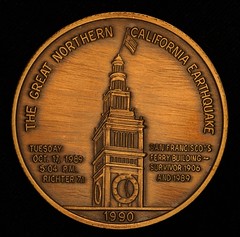 You asked for earthquake medals, and I have one to add. This commemorates the October 1989 California quake that struck just as the first game of the baseball World Series was about to get underway between the San Francisco Giants and the Oakland Athletics.
You asked for earthquake medals, and I have one to add. This commemorates the October 1989 California quake that struck just as the first game of the baseball World Series was about to get underway between the San Francisco Giants and the Oakland Athletics. I designed it for the 1990 medal issue of Liberty Numismatic Society, and my initials are nearly concealed in place of columns above the oblique clock image facing left.
One bit of trivia: at the time of the jolt the flag on San Francisco's ferry building had already been lowered for the day, and that is how I drew the image seen on the medal. Another society member convinced me that it would sell better with the flag flying gloriously, so that's how it came to be added at the engraving stage.
When the quake struck I had just emerged from a BART train station and was walking up some steps. A young couple in front of me lost their balance and started to fall back into me. I saw them coming and was just able to lean forward a bit to prevent them from sending us all down the stairs. There were only about five steps, but it would have smarted just the same. The only damage at home was one broken coin exhibiting trophy.
Eric Holcomb writes:
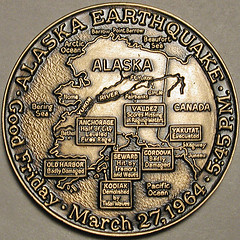

ON THE AUSTRIAN SILVER PHILHARMONIC COIN
In order to transport the face value of EUR10,000, you have to carry 6,666 one ounce coins of a face value of EUR1.50 each, that is more than 200 kg of silver! The bid offer spread of one-ounce silver coins is at least 10%, and this is a very optimistic assumption. So all in all, that's a hefty price and effort for the repatriation of your tax evasion savings! Remember, we are talking about a border where there usually are no controls any more.
So, this article sounds more like a modern urban legend than a matter of fact. The silver disks are in demand, no doubt, but there have to be other explanations for that.
To read the earlier E-Sylum article, see: AUSTRIA'S SILVER PHILHARMONIC USED TO SKIRT TAX LAWS (www.coinbooks.org/esylum_v12n27a22.html)
ON LOW-VALUE DEBIT CARDS
Regarding low-value debit cards, Ralf Böpple writes:Their use is limited to what I would call a "close circle", exactly for the reason that you can't use it elsewhere. And "elswehere" always will be a much bigger part of the economy than your local laundomat.
To read the earlier E-Sylum article, see: DICK JOHNSON ON LOW-VALUE DEBIT CARDS (http://www.coinbooks.org/esylum_v12n27a25.html)
THE BOOK BAZARRE
BANKRUPT CALIFORNIA ISSUES PAYMENT WARRANTS
The State of California is in serious economic trouble. Their fiscal year began on July 1 without a budget and a significant deficit between the government’s income and their legal obligations to provide services to the citizens of California. Governor Arnold Schwarzenegger declared a fiscal emergency and order the printing of IOUs to pay state debt obligations. Initially, 28,750 IOUs worth $53.3 million will be issued mainly for personal income tax refunds. The IOUs will carry a 3.75-percent interest rate redeemable by October 2 or earlier if a budget agreement is reached.
The financial term for the IOUs are “registered warrants.” For the citizens receiving these IOUs, most of California’s in-state and nationally-owned banks said that they will accept the IOUs as deposits for a limited time.
California last issued IOUs in 1992 during a similar budget crisis.
Records of the how many of the IOUs were redeemed do not seem to be publicly available and I did not find an auction record for the paper issued in 1992. However, it stands to reason that the paper IOUs will be highly collectible. Opportunists have been using online classified websites to offer to purchase these warrants as souvenirs (see an ad).
Although registered warrants are not legal tender, people may elect to trade and barter these IOUs for goods, services, and even legal tender money. We can only wonder if the paper will become more valuable as a collectibles as the Zimbabwe notes after their government devalued Zimbabwean Dollar because of hyperinflation. That ball is in the court of the California legislature. But they will make interesting collectibles.

Has anyone seen one of the new California warrants? Can anyone send us an image? A warrant with a low face value would be ideal for collecting. As I've said many times before, the time to be collecting contemporary numismatic issues is NOW, while they are still fresh and plentiful. In a few months most will be gone from the face of the earth. Californians - ask around and see if you can get one. Better yet, acquire three or four low value ones and donate the extras to our major national numismatic museums for posterity. -Editor
To read the complete article, see: California Currency (http://coinsblog.blogspot.com/2009/07/california-currency.html)
Other colonies followed suit with their own issues of paper money. Some were considered government IOUs, redeemable later in "hard" currency (silver or gold). Others were issued as "legal tender" in themselves. They were "as good as gold" in trade, without bearing debt or an obligation to redeem the notes in some other form of money later. The new paper money not only made the colonies independent of the British bankers and their gold but actually allowed the colonists to finance their local government without taxing the people. Colonial assemblies discovered that provincial loan offices could generate a steady stream of revenue in the form of interest income by taking on the lending functions of banks.
The same solution was employed in other countries later. When Argentina's government workers were faced with massive layoffs, their unions persuaded six state governments to pay them instead with state bonds or IOUs in small denominations. The IOUs could then be used to pay for state services and taxes, and everyone in the local economy accepted them in trade.
To read the complete article, see: California Dreamin': How the State Can Beat Its Budget Woes (http://axisoflogic.com/artman/publish/Article_56258.shtml)
G8 SUMMIT LEADERS GIVEN IMAGINARY FUTURE WORLD CURRENCY
 World leaders attending the Group of Eight summit opening Wednesday in Italy will each be presented with a gift from the past and one for the future.
World leaders attending the Group of Eight summit opening Wednesday in Italy will each be presented with a gift from the past and one for the future.Handmade books portraying works by Neoclassical sculptor Antonio Canova, as well as gold coins representing an imaginary future world currency will be given to the participants at the opening of the three-day summit.
There are 10 copies of the book, commissioned by Italy's Premier Silvio Berlusconi from the Bologna-based art publishing house Fondazione Marilena Ferrari, each with a personalized dedication for the leader who receives it.
The 28-inch by 17.5-inch (71-centimeter by 44.5-centimeter) Canova books were crafted at no cost by 23 Italian craftsmen using traditional techniques, the publishing house said. Each weighs 53 pounds (24 kilograms).
The books' covers are decorated with white marble bas-reliefs and the volumes are bound with silk and gold thread. They include etchings and dozens of black and white photographs of Canova's artworks, including artistic close-ups of his statues.
The coins, made by Belgian Luc Luycx, who designed one side of the Euro coins, are called "eurodollars," in a symbolic call for a common currency to unite Europe and the United States.
They have a value of euro 2,800 ($3,900) and were produced by the United Future World Currency, a group pushing the idea of a global currency.
To read the complete article, see: G-8 leaders to receive books on Canova, gold coins (http://apnews.myway.com/article/20090708/D99AAJS02.html)
UNITED FUTURE WORLD CURRENCY COINS
After reading the G8 Summit article I found the United Future World Currency group's web site and it shows the following image of the proposed coin. -Editor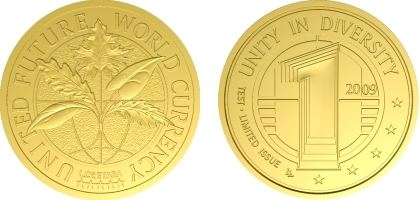
From the web site:
A single currency becomes the premise for an increasingly global planet. A virtual currency capable of speaking a single, comprehensible language to foster humankind's innate desire to go farther, to surpass boundaries, and move towards true principles of peace, freedom, brotherhood and understanding beyond issues of race, political and religious beliefs and party interests.
We are presenting the peoples of nations, governments, institutions, intellectuals, ordinary people, pragmatists and idealists, scholars and, above all, young people - the real protagonists of the future - with a simple, ingenuous yet determined long-term vision for building an ideal bridge with tomorrow and interpreting a dream to transform into reality.
Another page on the site gives the history of the project and mentions several earlier coin prototypes.
A number of Eurodollar samples were created. In 2000, Dr. Sassoli registered the Eurodollar trademark and embarked upon a project for the coin. The coin design featured the DNA helix, mixing the symbols of the US Dollar and Euro. This was followed by other samples and projects over the years…
This year, Dr. Sassoli asked Luc Luycx (creator of the uniform side of the Euro coin, from the Royal Belgium Mint) and Laura Cretara, chief engraver of Italian State Mint who created the “500 Lire” dual-metallic coins and the Italian side of the 1 Euro coin (Leonardo’s Vitruvian man), to begin work on a new design for an international currency program. In addition, Dr. Sassoli asked Rome University’s Engineering Dept. to study the potential for a new coin with a high level of protection against counterfeits. In short, an “intelligent coin” that can communicate with mobile phones, give and receive inputs and be recognized as fake or authentic.
To visit the United Future World Currency web site, see: www.futureworldcurrency.com
ROYAL AUSTRALIAN MINT MOUNTS NEW COIN EXHIBIT
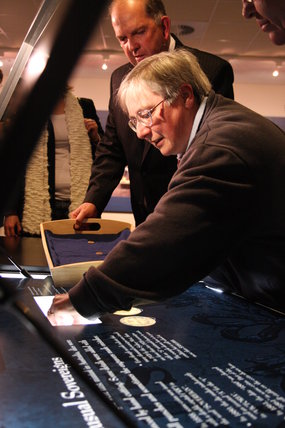 The Royal Australian Mint in Canberra has given a lucky member of the public a rare look inside its vault.
The Royal Australian Mint in Canberra has given a lucky member of the public a rare look inside its vault.The vault holds a collection of coins worth more than $12 million and its doors are not opened often.
Despina Tramoundanis from Murrumbateman won a raffle to carry four rare coins, valued at over $1 million, from the vault to their display case on the second floor.
One of the coins that was moved is a rare 1920 sovereign that was made in Sydney.
The Mint says a similar coin sold at auction for $800,000.
The other three coins are 19th century sovereigns, distinctive because they have spelling mistakes on them.
To read the complete article, see: Australian Mint offers rare peek inside vault (http://www.abc.net.au/news/stories/2009/07/07/2618876.htm)
1889 RHODE ISLAND LIFESAVING MEDAL TO BE DISPLAYED
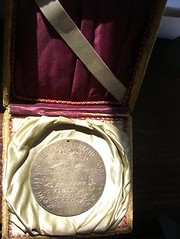 Weeks before a partial restoration of the Westport lifesaving station is completed, the Westport Fishermen’s Association got a look Monday at a medal that may prove a rescue once took place off the shore, something the association had believed never happened.
Weeks before a partial restoration of the Westport lifesaving station is completed, the Westport Fishermen’s Association got a look Monday at a medal that may prove a rescue once took place off the shore, something the association had believed never happened.Lois DiLibero, who lived in Newport, R.I., as a young girl, visited from Florida to tour the station and show off the medal she found in a box handed down from her late aunt. DiLibero's aunt may have lived in the same Newport home as the woman who received the medal in 1889, Sarah Turner. Little else is known about the rescue. The medal says it was awarded by the Westport Harbor Humane Society, a group that no longer exists.
While researching the rescue and Turner's background, the Westport Fishermen’s Association is also coordinating the restoration of the lifesaving station, part of which could open by the end of the month. The association, which is leasing the building from the state, hopes to open the triangular visitors center this fall.
Sarah Turner’s medal would be a central piece of the visitors center as a rare artifact from the station, which was in use for only 25 years.
Turner’s medal is six ounces of solid silver, DiLibero said. A few inches in diameter, it commends Turner for her “distinguished bravery” in rescuing a shipwrecked boat near the entrance to the harbor on Aug. 25, 1888. It comes in a case with a ribbon that features Turner’s name. DiLibero and Fishermen’s Association members are figuring out how the medal will be displayed at the station.
DiLibero contacted the Fishermen’s Association after reading last year that no rescues were believed to have taken place from the lifesaving station.
The association hasn’t been able to verify the authenticity of the medal, but Gillespie believes that Turner, whose age at the time is unknown, may have taken a boat out to rescue the crew. In the days before telephones, contacting professional rescuers would have taken too long.
To read the complete article, see: HEAVY MEDAL: Fla. woman finds memento of daring rescue (http://www.heraldnews.com/news/local_news/x1885883883
/HEAVY-MEDAL-Fla-woman-finds-memento-of-daring-rescue)
THE CRAZE FOR THE ROYAL MINT'S DATELESS 2009 TWENTY PENCE

Lloyd Hefferman told The Sunday Telegraph he discovered he was given a 20-pence coin missing a date when he recently purchased a pint at The Botolph Arms pub in Peterborough.
"I had heard about the rare 20-pence pieces on the news that day, and was talking with my mates about how brilliant it would be to find one," Hefferman said.
To read the complete article, see: Man's beer change includes rare coin (http://www.upi.com/Odd_News/2009/07/05/
Mans-beer-change-includes-rare-coin/UPI-64301246822888/)
Annamarie Byrne, from Kingstanding, went on the hunt for one of the coins minted without a date after she was told by neighbours she might get £50 for it.
But the 28-year-old single mum of four is hoping to hit the jackpot after hearing that one seller on eBay had sold theirs for thousands.
She said: “I was really surprised to find it because I’m not normally very lucky. I go to bingo with a friend and we never win anything.
“I’m a single mum so this money would come in very handy. If I got quite a bit I would take the kids on holiday to Disneyland.”
Her four-year-old son Eugene said he was pleased to have the rare coin among his own collection that he keeps in a silver whale moneybox.
“I’m excited because if we got some money we might go on holiday and I’d like to see a big dinosaur,” he said.
To read the complete article, see: Mum raids son's piggy bank and finds 20p coin worth thousands (http://www.birminghammail.net/news/birmingham-news
/2009/07/04/mum-raids-son-s-piggy-bank-and-finds-20p-coin-worth-thousands
-97319-24072868/)
Duncan Young was stunned when he was given one of the dateless coins in change at a local supermarket.
Freelance photographer Duncan Young, of Grimsby, found his coin in change from Sainsbury's Local in St Peter's Avenue, Cleethorpes, on Tuesday.
He said: "Obviously the shops are not checking the coins as I got mine in change.
"I didn't think anything of it, but later I looked more carefully and saw that one was a rare unmarked coin.
To read the complete article, see: Duncan can coin it in with rare 20p (www.thisisgrimsby.co.uk/news/Duncan-coin-rare-20p/
article-1156974-detail/article.html)
'Mules' are rare and such anomalies make them highly sought-after among coin collectors. The previous mules arose when a batch of 2p coins were minted with the words 'New Pence' instead of 'Two Pence' in 1983.
Christopher says: 'These coins are worth far more than they were when made in 1983 and we can sell them for between £500 and £700, depending on their condition.'
Collector and trader Glenn Ogden, 50, from Chudleigh, Devon, says people should get involved not just to make money, but should have a genuine interest in coins. 'My grandfather used to give me newly minted half crowns as a child,' he says. 'I would eagerly spend the coin on sweets and show him the change. He was disappointed, but as I grew up, my interest in history and the beauty of coins grew.
To read the complete article, see: 20p coins worth a mint? Now it's the £700 2p coin (www.thisismoney.co.uk/investing/article.html?in_article_id=488426)
VIRTUAL CURRENCY IN CHINA: THE QQ COIN
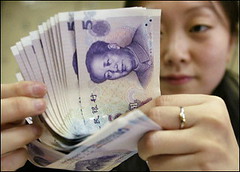 The Chinese government is a little worried about how much virtual cash is being traded in the country, The New York Times reports.
The Chinese government is a little worried about how much virtual cash is being traded in the country, The New York Times reports.In fact some virtual currency, like the QQ coin, is actually affecting the market for the renmibi, China's actual currency.
Much of the $2 billion in virtual currency is used to play games, but significant chunks, David Barboza writes, are now being traded for real physical goods, like clothes, food and services.
The shift of using virtual currency to pay for real products is part of what's freaking out the Chinese central bank.
Beijing is so concerned about the virtual life of its citizens that the Times says, "it has repeatedly sought to tame the online gaming market with new regulations (and even Internet addiction camps) but the activity continues to grow."
Here in the states the virtual gaming market is starting to undergo a similar boom. Zynga, creators of the Mafia Wars Facebook game, is due to rake in somewhere north of $100 million this year on its virtual offerings.
To read the complete article, see: Virtual Currency In China Is A $2 Billion Economy (www.businessinsider.com/virtual-currency-in-china-is-a-2-billion-economy-2009-7)
To read the original New York Times article, see In China, New Limits on Virtual Currency (www.nytimes.com/2009/07/01/technology/internet/01yuan.html)
THE STANDARD GRILL'S FLOOR OF PENNIES
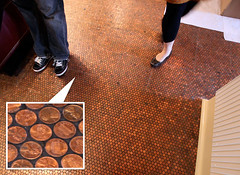
Daniel writes:
Jonathan writes:
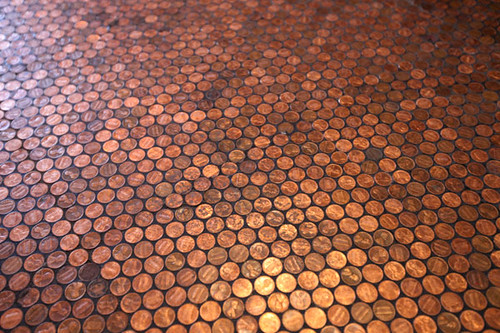
Ricardo writes:
To read the complete article, see: Floor of Pennies - The Standard Grill (www.notcot.com/archives/2009/06/floor_of_pennie.php)
FEATURED WEB SITE: EARLY MEDIEVAL CORPUS OF COIN FINDS
This week's Featured Web site is the Early Medieval Corpus of Coin Finds.
www-cm.fitzmuseum.cam.ac.uk/emc/
